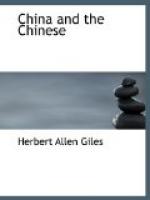Many of Lao Tzu’s sayings are mere moral maxims for use in everyday life.
“Put yourself behind, and the world will put you in front; put yourself in front, and the world will put you behind.”
“To the good I would be good; to the not-good I would also be good, in order to make them good.”
All together, with the comparatively few scraps of Lao Tzu’s wisdom to be found in the treatise, we should be hard put to understand the value of Tao, and still more to find sufficient basis for a philosophical system, were it not for his disciple, Chuang Tzu, of the fourth century B.C., who produced a work expanding and illustrating the Way of his great Master, so rich in thought and so brilliant from a literary point of view that, although branded since the triumph of Confucianism with the brand of heterodoxy, it still remains a storehouse of current quotation and a model of composition for all time.
Let us go back to Tao, in which, Chuang Tzu tells us, man is born, as fishes are born in water; for, as he says in another place, there is nowhere where Tao is not. But Tao cannot be heard; heard, it is not Tao. It cannot be seen; seen, it is not Tao. It cannot be spoken; spoken, it is not Tao. Although it imparts form, it is itself formless, and cannot therefore have a name, since form precedes name.
The unsubstantiality of Tao is further dwelt upon as follows:—
“Were Tao something which could be presented, there is no man but would present it to his sovereign or to his parents. Could it be imparted or given, there is no man but would impart it to his brother or give it to his child. But this is impossible. For unless there is a suitable endowment within, Tao will not abide; and unless there is outward correctness, Tao will not operate.”
It would seem therefore that Tao is something which altogether transcends the physical senses of man and is correspondingly difficult of attainment. Chuang Tzu comes thus to the rescue:—
“By absence of thought, by absence of cogitation, Tao may be known. By resting in nothing, by according in nothing, Tao may be approached. By following nothing, by pursuing nothing, Tao may be attained.”
What there was before the universe, was Tao. Tao makes things what they are, but is not itself a thing. Nothing can produce Tao; yet everything has Tao within it, and continues to produce it without end.
“Rest in Inaction,” says Chuang Tzu, “and the world will be good of itself. Cast your slough. Spit forth intelligence. Ignore all differences. Become one with the Infinite. Release your mind. Free your soul. Be vacuous. Be nothing!”
Chuang Tzu lays especial emphasis on the cultivation of the natural as opposed to the artificial.
“Horses and oxen have four feet; that is the natural. Put a halter on a horse’s head, a string through a bullock’s nose; that is the artificial.”




